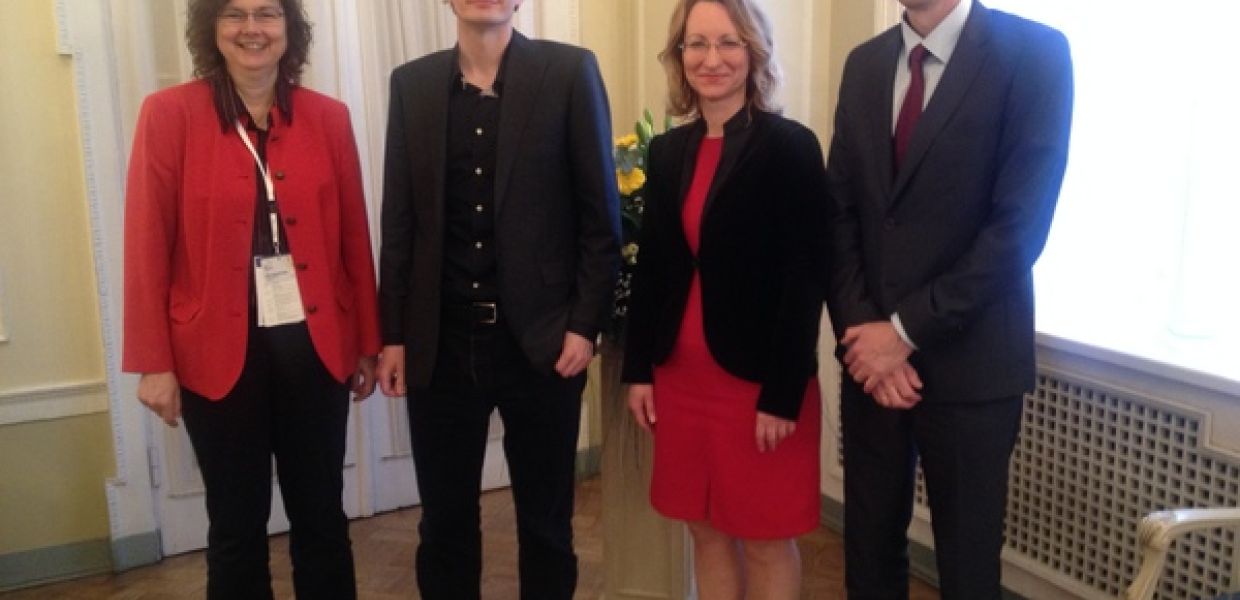Latvian Ministry of Culture and Europeana sign Memorandum of Understanding

This week, the Summit on the Multilingual Digital Single Market took place in Riga. Over 350 participants from across the continent gathered together to highlight the need to address the issues facing a multilingual Europe, and to discuss the solutions and initiatives emerging from the language technology sector which could help to do so.
For Europeana, multilingualism is a major challenge and priority, and one that our community is coming together to tackle in different ways, as we explore further in the first issue of our new EuropeanaTech journal. The Riga Summit offered a timely opportunity to make new contacts in this area, as well as strengthen existing relationships with our collaborators.
It was also an important occasion as we signed a Memorandum of Understanding with the Latvian Minister of Culture, Dace Melbārde. The Memorandum looks to using Latvia’s public sector machine translation service, Hugo.lv, to expand multilingual access to Latvia’s cultural heritage data through Europeana.

From left: Dr. Márta Nagy-Rothengass, European Commission, Europeana’s R&D Manager, Antoine Isaac, Minister for Culture Ms Dace Melbārde and Tilde CEO Dr. Andrejs Vasiļjevs. Image: Dagnija Grīnfelde, CC BY SA.
Hugo.lv provides instant translation of texts, documents and websites from Latvian to English (and vice versa), and from Latvian to Russian. It is administered by the Culture Information Systems Centre, and, at the moment, is tailored to general and legislative domains where it achieves excellent results, as an article in our new journal explores.
The Culture Information Systems Centre will now further adapt it for cultural heritage metadata from museums, libraries and archives. Once Hugo.lv has been successfully tuned to the cultural domain, Europeana will then integrate its results. To complement this work, the Latvian Ministry of Culture will substantially increase the number of cultural items contributed to Europeana.
By translating Latvian data provided to Europeana, there is a valuable opportunity to enhance access to the country’s digitised cultural heritage through Europeana’s portal, and more widely through the apps developed by re-users of Europeana data.
Hugo.lv makes the most of state-of-the-art language technology developed by a Latvian company, Tilde, and we hope that the agreement shows how such technology can benefit the cultural sector more widely. As Dace Melbārde remarked, "I am glad to sign this Memorandum which will bring new opportunities to both sides. Quality translation of Latvian cultural heritage data in the future will expand and improve multilingual access to this information and its international movement significantly. At the same time, it will enrich the content of Europeana by strengthening the diversity and availability of European cultural heritage."
We hope the Latvian Ministry of Culture’s approach will come to act as an example of best practice, and could be reproduced by other EU member states in the near future. As the Riga Summit on the Multilingual Digital Single Market has shown, Europe has a vibrant and growing language technology industry, with huge potential to reduce or resolve the barriers language can cause. National partners in our Network have specific needs for language and data. Their expertise puts them in an ideal position to employ the options offered by the available software, and effectively complement the generic data enrichment and translation already offered by the core of the Europeana platform.
To find out more, you can read the press release from the Ministry of Culture of the Republic of Latvia, and the full text of the memorandum too.
